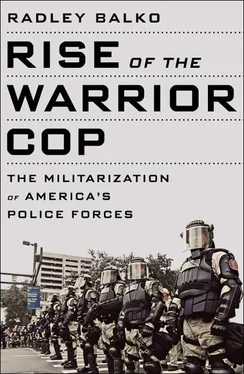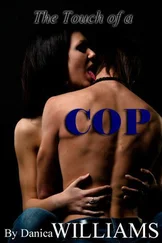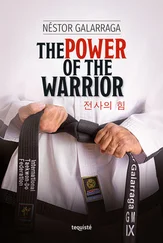They then sent police officers out into the city’s minority neighborhoods. City officials later acknowledged that this was to prevent the protests from getting out of hand and turning violent. But because of the city’s embrace of true community policing, dispatching cops to their beats en masse looked more like a show of support than a show of force. The cops knew the neighborhoods they were sent out to keep calm—not just the street grids and landmarks but the pastors, the school principals, and the community leaders. One local activist told the Times , “One of the reasons we survived is that people from the mayor to the City Council to the arts organizations got out into the streets immediately and sided with the people, not against them.” 23
While paramilitary police raids—and botched raids—continued to soar in large cities around the country throughout the 1990s and 2000s, in my own research I’ve found only one mistaken raid by San Diego police since the 1990 raid at the home of Ken Fortner. Interestingly, since the late 1980s, San Diego has also boasted one of the lowest crime rates in the country. It consistently ranks among the five safest big cities in America. 24Crime in the city has been falling for the last two decades, just as it has in the rest of the country. San Diego’s crime rate peaked in 1989, however, just as the new policies were taking hold in the city. 25The national crime rate peaked in 1991. 26As we’ll see, there were a few other places that for at least a time bucked the trend toward more militarized police. As with San Diego in the 1990s—and even Washington, DC, in the early 1970s—not only were none of them overrun by drug dealers and gangs as a result, but there’s good evidence that their lower crime rates outperformed comparable cities and the country at large.

GEORGE H. W. BUSH TROUNCED THE DEMOCRATIC CANDIDATE, Massachusetts governor Michael Dukakis, in the 1988 presidential election, when he did it with a campaign that exploited the fear of crime like none since Nixon in 1968. The most notorious example was the racially loaded television commercial about Willie Horton, a black convict who raped and stabbed a white woman while on furlough from a Massachusetts prison. Bush and campaign manager Lee Atwater relentlessly attacked Dukakis as soft on crime, hitting him with Horton, his opposition to the death penalty, and his ties to the ACLU. Three years later, Atwater—then fighting an inoperable brain tumor—would apologize to Dukakis. 27But Bush’s victory was a green light for a whole new slate of tough-on-crime initiatives.
One of his first moves was to appoint William Bennett to be his drug czar. Bennett had practically begged for the job, calling Bush and Bush’s chief of staff, John Sununu, several times after the election to ask for the position. Bennett had headed up the National Endowment for the Humanities and then the Department of Education under Reagan. He had run both agencies as a proud moral scold. Which isn’t to say he was a prude. Bennett was an obese man, a chain-smoker, and, the country would learn years later, he had a pretty serious jones for video poker. But those weren’t culture war issues. Bennett was also a fierce drug warrior and a favorite of Christian Coalition types. After leaving office, he’d basically appoint himself the country’s guardian of virtue.
Bennett’s main contribution to the drug war was to infuse it with morality. “The simple fact is that drug use is wrong,” he wrote in a 1990 essay for Reader’s Digest . “And in the end, the moral argument is the most compelling argument.” 28That was the lingering irony of Bennett’s reign in the Office of National Drug Control Policy (ONDCP). The man who often struggled to control his own indulgences was ready to unleash a full federal arsenal of force on people whose indulgences he personally found immoral. Of course, Bennett’s indulgences were legal. But when pressed on the morality question— Why is marijuana immoral, but alcohol and nicotine aren’t? —the best he and his surrogates could do was point to the fact that pot was illegal. When confronted with the legalization question, Bennett would return to the argument that pot was immoral. The transparently circular bit of argumentation—it’s immoral because it’s illegal, and it’s illegal because it’s immoral—would have been amusing if not for the fact that it had some very real consequences, up to and including ruining and ending lives.
For all the war rhetoric to have come from politicians’ mouths over the previous twenty years of drug prohibition, Bennett’s somehow managed to reach new heights of bellicosity. Embedded in his morality approach to drug prohibition was a new effort at dehumanizing drug users. Bennett demanded that drug warriors in the administration stop talking about addicts as “sick” and stop referring to addiction as a health problem. Going forward, the federal government would simply view them as bad people. Fundamentally bad people aren’t cured or mended. The only real question is how best to remove them from the good people. 29
On his first day in office, Bennett took a page from Nixon and designed a plan for the nation’s capital. He wanted “a massive wave of arrests” of drug offenders, and proposed converting abandoned buildings into temporary prisons to house the arrestees until he could get more money to build more prisons. He didn’t mince words about his intent. “I’m not a person who says that the first purpose of punishment is rehabilitation,” Bennett said. “The first purpose is moral, to exact a price for transgressing the rights of others.” It’s a line Bennett and other drug warriors would use over and over again for the next decade. 30Of course, Bennett was advocating mass punishment for consensual crimes, which by definition don’t violate the rights of others. But Bennett was never one for consistency—just force. Bennett and some members of Congress briefly even considered declaring martial law in DC and bringing in the National Guard to enforce it. He did impose an 11:00 PM curfew, which was later overturned by a federal judge. In 1990 Bennett floated the idea of suspending habeas corpus for drug offenders. “It’s a funny war when the ‘enemy’ is entitled to due process of law and a fair trial,” he told Fortune . Lest that seem too extreme, he hedged a bit. “By the way, I’m in favor of due process. But that kind of slows things down.” 31Later he told Larry King that he’d be up for beheading drug dealers. He conceded that doing so might be “legally difficult,” but said that, “morally, I have no problem with it.” 32
Bennett even urged children to turn in their friends who used drugs to police. Doing so, he said, was “an act of true friendship.” 33The country seemed to agree. One poll found that 83 percent of respondents would call the police on a drug-using relative. 34Urging families to turn one another in to the government for victimless crimes was once an idea we associated with Iron Curtain regimes. But the drug war encouraged it. Back in 1983, Daryl Gates had started the Drug Abuse Resistance Education (DARE) program, which sent cops into Los Angeles schools to talk to students about drugs. The program swept the country, and by the mid-1990s there were numerous reports of children who had turned in their parents for small amounts of drugs after attending DARE lectures. DARE officials denied that the program encouraged such behavior, but in most cases the children were commended by police and DARE for “doing the right thing” after watching their parents marched into squad cars and taken to jail for what were usually possession charges. 35
Читать дальше













